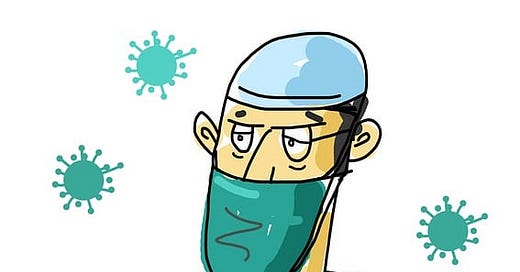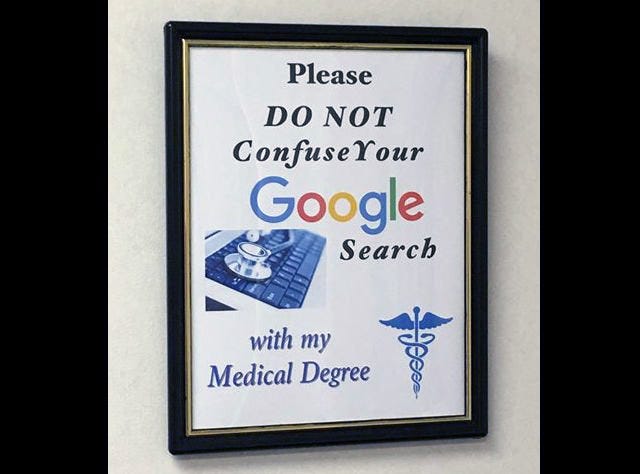It would be understandable if you thought that your doctor regularly kept “up to date” on medical literature, right?
After all, this is what they would need to do to determine the best course of treatment for the types of illnesses they deal with, right?
The truth is that most doctors hardly spend any time looking at medical literature at all.
Most doctors spend little to no time reading research papers
Milton Packer, a cardiologist, wrote about this on MedPage Today, a site that publishes medical news:
In the past, physicians pretended to keep up with the medical literature. If they missed a recent relevant paper, they felt a bit guilty. Now, physicians do not even pretend. There is no guilt associated with "not keeping up." Everyone has conceded that they can't -- and won't -- be current in their medical reading.
Just how bad is it? Much worse than you think. Packer goes on to say:
At a recent meeting of nearly 200 young physicians, I asked how many actually read an issue of any journal that was delivered to them, electronically or physically.
The answer: Zero.
Packer asked the physicians if they at least read the titles of the papers in “top” journals like the New England Journal of Medicine every week.
No one did.
Did they pick one journal in their field of interest and try to keep up?
Not a single hand went up.
Then I asked the most revealing question of all. When is the last time that you read any single paper on any topic from start to finish?
Silence.
Packer also mentions that these answers were not unique to young physicians.
He also recounts how he had posted an opinion piece about the results of a major trial, and colleagues approached him with “really strong feelings about the study.” When he asked them whether they had actually read the original paper, “of more than 40 people, many of them opinion leaders in the field, only two claimed that they did.”
But get this: Neither could tell him what the main findings of the study were.
You can read the full article here: Does Anyone Read Medical Journals Anymore?
Even when doctors read studies they don’t know how to critically assess them
But even when doctors do read research papers, they often don’t know how to critically appraise them.
When Packer asked physicians why no one was reading any papers, the answer was: We don't know how to read them.
Other doctors have said similar things. Kevin Barraclough, a general practitioner, wrote about this in his article Why doctors don't read research papers. He wrote, of the “volume of statistical argument”:
How many doctors have a clue what it means?
Richard Smith, former doctor and editor at the British Medical Journal, has also mentioned that most doctors “are not even trained to appraise critically a scientific article.” He mentioned this in his article The trouble with medical journals:
Medical journals differ from scientific journals in that they are mainly read not by scientists but by practising doctors. But are not doctors also scientists? We are, in that when we were medical students our heads were filled with anatomy, biochemistry, physiology and (if we are under 40) by molecular biology; but such teaching does not a scientist make. Most doctors feel uncomfortable describing themselves as scientists. Most are not even trained to appraise critically a scientific article.
And:
Why then are they sent journals filled with increasingly complex science, most of which depends on statistical methods that they do not understand? It is, I think, a historical hangover, and there are lots of data to show that doctors spend little time reading the original research in journals. They are sensible not to do so.
He goes on to say that the average doctor spends very little time reading journals, and in fact, it makes sense for them not to do so:
The average doctor spends not much more than an hour a week on professional reading. Thus, it does not make sense to spend most of that time reading one complex study. Doctors, sensibly, should read synoptic, educational material; mostly that is what doctors do. Often they read this material not in journals but in what are condescendingly known as `throwaways', i.e. newspapers that use journalists to summarize complex material and which are free because they are funded by pharmaceutical advertising.
In a 2002 New York Times article, internal-medicine specialist Gordon H. Guyatt was quoted as saying:
If you said to most members of the general public, 'Physicians have been trained in such a manner that they have no idea how to read a paper from the original medical literature or how to interpret it,' that would surprise the public.
An example of a prominent physician reading scientific literature incompetently
You may have heard of Eric Topol. He’s an American cardiologist who’s frequently quoted in the media. His Wikipedia says that he “is one of the top 10 most cited researchers in medicine.”
Surely he knows how to read the medical literature competently, right?
Unfortunately, he’s repeatedly demonstrated incompetence at reading the medical literature.
For example, Topol tweeted the results of an observational study on Paxlovid like so:
But he missed something very important in the paper. Take a look at the graph Topol tweeted:
This shows cumulative incidence for all-cause hospitalization from day zero to day 28 since last positive COVID test. You’ll notice that at the zero timepoint, which I’ve circled in hot pink, the people who weren’t given Paxlovid (red curve), started off with higher incidence of hospitalization than those who were given Paxlovid (blue curve).
Does this mean Paxlovid is some kind of miracle drug that works even before you’ve given it to patients?
No, that would be impossible.
Instead, the two groups, those who got Paxlovid and those who did not, differed substantially in their underlying health to begin with. In this case, those who did not get Paxlovid tended to have worse health to begin with.
There were other problems with this paper, which Dr. Vinay Prasad discussed here. Prasad also detailed some of Topol’s other major errors here:
By the way, “thought leaders” like Sam Harris seem to listen to people like Eric Topol. They should find better sources of information.
You could probably do better
Now, if a medical doctor wanted to become more competent at reading research papers, he or she probably could. Most doctors, at the very least, are conscientious types; they’ve proven this by their ability to jump through numerous hoops like passing medical exams, etc.
They could get better at appraising studies by reading more papers, learning statistics, learning about the methods used in research, etc.
But honestly, most don’t put in the work to do that.
A doctor who does not put in the work to keep evolving, who does not appreciate how complex biology is, who doesn’t bother to read studies or doesn’t know how to critically appraise them, who doesn’t recognize the influence of the pharmaceutical industry on trials, or the fingerprints of “spin” present in much of “science journalism,” is borderline useless to you.
Don’t get me wrong: our medical system is decent at dealing with acute problems like broken limbs or acute bacterial infections. If you’re dealing with issues like these, you’ll probably be able to find decent care.
But when it comes to most other things, like what the best diet is, or the root causes of chronic issues like diabetes, dementia, heart disease, multiple sclerosis, allergies, psoriasis, Crohn’s disease, hormonal imbalances, insomnia, etc., the sad truth is that your average medical doctor does not have a clue beyond being able to prescribe a drug that will mask your symptoms.
These doctors just read summaries of trials, written by “science journalists.” But honestly, you could do that too.
Just remember that your doctor is just a consultant. In the end, it’s up to you to seek out independent information, whether that means finding better doctors, doing your own research, or both.
You can’t just blindly trust doctors.
If you liked this article, consider becoming a paid subscriber, or you can buy me a coffee.











Recent discussion with my new oncologist: what do you think about the idea of using repurposed drugs to treat my cancer? After all there are numerous studies and trials going on using ivermectin with success and it’s non toxic. . Her answer: What’s ivermectin?
Frankly, I almost never go to see a doctor. But if I do, my preference is that they be close to my age. Then I can evaluate how they care for themselves. Are they overweight, fit, healthier than me? What do they do to care for themselves? 99% of the time, they are in *much* worse shape, in comparison. Most don’t know a thing about nutrition, or exercise physiology, for starters. If they’re setting a broken bone, or putting in some stitches for a wound that needs that, fine. But as soon as they reach for the PDR, or mention statins or what have you, it’s over.
Your money is better spent on good quality clean food, water, and a handful of supplements.
Take care of yourself. Heal thyself.